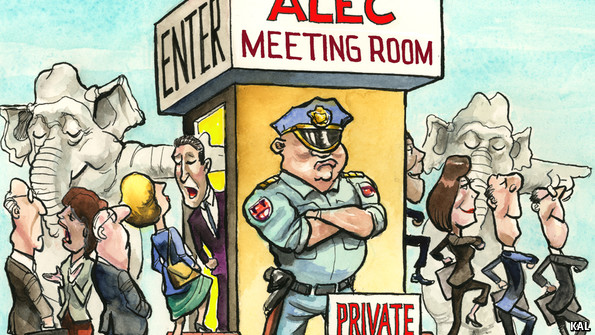Lexington
How left-wing protesters helped a conservative club that ghost-writes state laws

ALEC is a forum that for 40 years has pushed states to adopt conservative laws on everything from guns to taxes. It introduces state legislators to lobbyists and businesses behind closed doors. Its task-forces craft “model” bills suitable for replication nationwide. It is hugely influential. Hundreds of ALEC-inspired bills are introduced in the states each year. Currently, about a third of state legislators are members. In Washington, DC more than 90 members of Congress are alumni, all but one of them Republican.
This gives progressives plenty to protest about. In Chicago activists led by Jesse Jackson asserted that ALEC-drafted bills purporting to curb voter fraud are in fact aimed at suppressing the black vote. Mr Jackson is seldom slow to cry racism, but this allegation cannot be lightly dismissed. ALEC-inspired bills requiring voters to show photo-ID typically make voting harder for such Democratic-leaning groups as students, the poor and immigrants. In Pennsylvania in 2012, a Republican bigwig boasted that such rules would win the state for his party.
Inside the hotel, behind lines of beefy cops and beefier private guards, meeting-goers were equally angry, but for different reasons. What really riled them was a letter to ALEC’s corporate donors from Senator Dick Durbin, an Illinois Democrat, demanding “clarification” of their views on Stand Your Ground. Intimidation: a blatant attempt, grumbled ALEC supporters, to frighten donors away. Indignation suffused the gathering. Speaker after speaker denounced the “radicals” outside. At a breakfast for all members a prayer was said, asking God for help in showing love to the protesters, even if it was “not reciprocated”.
All the huffing and puffing misses a pair of ironies, however. First, although social issues (such as guns and race) are what most enrage ALEC’s critics, the group has largely dropped them. For years ALEC operated more or less out of sight, but recently it has suffered numerous leaks and exposés. Its corporate donors, who typically do not care about social issues, have faced boycotts. Scores have cut ties. So in 2012 ALEC vowed to work only on broadly economic subjects. It ditched half its stock of model bills, published the rest and promised more transparency (which is why Lexington was inside the Chicago hotel, though still not allowed into task-force meetings). Priorities now include market-friendly reforms of regulations, pensions, taxes, schools and health care; curbs on lawsuits against companies; and a more libertarian approach to criminal justice, reversing once-ferocious lock-’em-up tendencies.
ALEC has specifically washed its hands of all bills aimed at tightening voting rules and expanding gun-owners’ rights. That does not impress the protesters, who say a baleful legacy will live on until such laws are repealed. Yet that stand-off misses a second irony. By brow-beating ALEC into embracing a mostly-economic agenda, critics have done the group a favour. In today’s politics, the economy is where the action is.
ALEC will not stop being controversial. It remains a body where climate-change sceptics address elected politicians at a meal co-sponsored by an energy firm and argue that carbon dioxide is harmless “plant food”. Its private-enterprise advisory council is dominated by executives from such unloved industries as coal, oil, tobacco and drugs. For all the talk of free markets, plenty of corporate members have tried to slip in rent-seeking bills over the years. (ALEC’s defenders insist that firms cannot go too far, because rivals are also in the room.)
Pick your battles
But ALEC may find that by narrowing the range of battles it picks, it
will win more of them. The Chicago meeting heard that voters have
rarely been so receptive to proposals to make states more competitive,
even when they involve curbing minimum wages and cutting taxes on
business. Elected members were hailed as heroes for passing pro-business
laws in such unlikely places as Florida, Michigan and Wisconsin—all
Obama-voting swing states. “What were you thinking?” a Michigan
Republican was asked, as he described a push to weaken his state’s
powerful trade unions. Conditions had changed, he explained. Folks in
Michigan, a birthplace of carmaking, hate watching new car plants open
in rival states. They lament that their children move away to find work.
Michigan unions over-reached, asking voters to enshrine union
privileges in the state constitution. The unions were rebuffed.It is not that Americans uniformly back belt-tightening austerity: they do not. But in the corridors in Chicago, the talk was of a new mood of urgency about public finances, helped by highly visible bankruptcies of local governments, notably in Detroit. The most candid members talked of channelling public resentment against those seen as enjoying unfair perks in hard times, such as welfare recipients or public employees with generous pensions. People feel they are paying for a safety net that others enjoy and it makes their “blood boil”, said a state senator.
Put another way, America is going through a rare moment in history when taxes, spending and regulation are at the white-hot centre of political debate. ALEC should thank its foes for forcing it to clarify its role as a place where business and politics meet, for good and ill. It should come fully out of the shadows and join that battle of ideas.
No comments:
Post a Comment